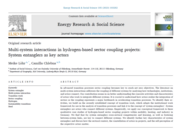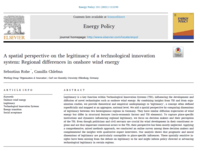Contact:
Project leader
Team
Activities
New paper on sector coupling published
In their paper "Multi-system interactions in hydrogen-based sector coupling projects: System entanglers as key actors", Meike Löhr and Camilla Chlebna identify so-called "system entanglers" as key actors connecting multiple sectors. Based on three hydrogen projects from the mobility, heat and industry sectors, they analyse how these actors contribute to the coupling of multiple systems and define their core characteristics and competencies: Central to this are the development of cross-sectoral competencies and cross-sectoral learning processes, as well as the active creation and fostering of between-system links. They also show that the actor constellation, the sectoral context and self-perception as a system entangler have an essential impact on successfully linking different sectors.
The paper is available for the next 50 days at this link: https://authors.elsevier.com/a/1hlhQ7tZ6Z-FaS
New paper on sector coupling published
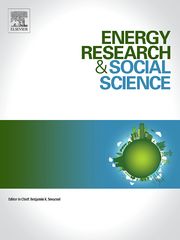
In their paper "Multi-system interactions in hydrogen-based sector coupling projects: System entanglers as key actors", Meike Löhr and Camilla Chlebna identify so-called "system entanglers" as key actors connecting multiple sectors. Based on three hydrogen projects from the mobility, heat and industry sectors, they analyse how these actors contribute to the coupling of multiple systems and define their core characteristics and competencies: Central to this are the development of cross-sectoral competencies and cross-sectoral learning processes, as well as the active creation and fostering of between-system links. They also show that the actor constellation, the sectoral context and self-perception as a system entangler have an essential impact on successfully linking different sectors.
The paper is available for the next 50 days at this link: https://authors.elsevier.com/a/1hlhQ7tZ6Z-FaS
International Sustainability Conference (IST) 2023 in Utrecht
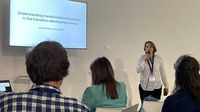
At this year's IST conference, several researchers from our research group in Oldenburg presented their work. Meike Löhr and Camilla Chlebna presented their paper on "Multi-system interactions in hydrogen-based sector coupling projects: System entanglers as key actors", which deals with the actors who work at the intersection of two sectors and contribute to coupling them, among other things, through cross-sectoral competencies. The respective paper is about to be published. Camilla Chlebna and Jannika Mattes presented their work on "Regional transition fields: how processes of adaptation and delimitation shape regional transitions". They develop a concept, rooted in organisational institutionalism, which contributes to explaining the often entrenched positions of actors in regional energy transitions. Sven Alsheimer, Tamara Schnell, Camilla Chlebna and Sebastian Rohe presented their literature review on the often used but seldomly defined terms legitimacy and acceptance entitled "Competing terms for complementary concepts? A systematic literature review on social acceptance and legitimacy of low-carbon technologies". The respective paper is about to be submitted to a journal. Camilla Chlebna also seized the opportunity to present ongoing work with Johannes Suitner in a short presentation about the tension between (growth oriented) regional development and sustainable transitions.
The IST was hosted by the Copernicus Institute of Sustainable Development and took place under the theme "Responsibility & Reflexivity in Transitions" from 30.08.2023 to 01.09.2023 in Utrecht.
Hydrogen discourse in Germany
New article published in EIST
In this article, Nils Ohlendorf, Meike Löhr and Jochen Markard examine the conflicts and multi-sectoral dynamics around the topic of hydrogen on the basis of the hydrogen discourse in Germany. Based on a discourse analysis of 179 newspaper articles from five major German newspapers, we show that most actors are in favour of the use of hydrogen for decarbonisation. Sceptical voices emphasise that hydrogen will remain expensive and only conditionally available in the medium term.
Initial conflicts emerge on three issues: the production of hydrogen (green vs. blue), the application of hydrogen (mainly in hard-to-decarbonise-sectors or in all sectors) and imports.
Our conceptual contribution shows how the discourse on hydrogen technologies is influenced by developments in the heat and gas, industry, transport and electricity sectors. We argue that actor positions in the discourse are influenced by 1) the sectoral context, 2) sector-specific technologies, and 3) strategic actor interests. With our article we contribute to the debate on multi-system interactions.
The article can be found here: bit.ly/3SW57BD – or just contact us.
21-25.11.2022 IST Conference 2022
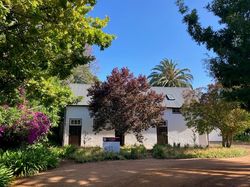
At this year's International Sustainability Transitions Conference (IST), Meike Löhr gave three presentations on two different paper projects, both, for the online community and in person. A joint paper together with Jochen Markard and Nils Ohlendorf on hydrogen coalitions in Germany investigates the emergence of a new policy subsystem using hydrogen as an example. Actors from a wide range of sectors share numerous positions on hydrogen and its importance for the energy transition, but differ on the production, use and import of hydrogen.
Furthermore, Meike Löhr presented the joint article with Camilla Chlebna on sector coupling using the example of hydrogen projects in the industrial, transport and gas sectors. Here it is actors working at the interface of the energy sector with one of the mentioned sectors who - equipped with cross-sector competences - make a difference in the realisation of sector coupling projects.
The IST took place from 21-25.11.2022 as a hybrid conference. It was hosted by three partners, Stellenbosch University in South Africa, Monash University in Australia, and Georgetown University in the USA.
Research stay at TIK at the University of Oslo
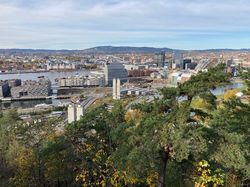
For three weeks starting in mid-October, Meike Löhr went to Norway to the TIK (Centre for Technology, Innovation and Culture) at the University of Oslo. In exchange with Allan Dahl Andersen and colleagues, she discussed research on sector coupling and multi-system interactions. These discussions were deepened during the one-day workshop "Cross-system agency in transitions", for which Meike Löhr presented the paper "Hydrogen-based sector coupling in Germany - a transition work perspective", which she developed together with Camilla Chlebna. At the TIK Institute Colloquium (innovation lunch) she also presented the joint paper with Camilla Chlebna and Jannika Mattes: "From institutional to transition work: Actors creating, maintaining and disrupting transition processes". She also took the opportunity to exchange with colleagues at the Fridtjof Nansen Institute, at SINTEF and the Mohn Centre of the University of Applied Sciences Western Norway in Bergen where she presented her research on hydrogen coalitions in Germany in the "out of the box" seminar.
With three lectures and numerous opportunities for exchange, the research stay was a very intensive, exciting and enriching opportunity.
REENEA final workshop with interview partners and stakeholders from the energy sector
Sharing and discussing research results with our interview partners and guests from the energy sector - that was the goal of the digital REENEA final workshop on 29.09.2022. For this purpose, the REENEA team presented research results on the fragility of regional transition processes, changing networks and actor strategies that can slow down or also accelerate the transition process to the approximately 20 participants.
In two workshop sessions on "Spatial Planning & Wind Energy" and "Sector Coupling & Hydrogen", the REENEA team also provided insights into current research projects. These were complemented by short impulses from Karin Potthoff (Regional Planning North Hesse), Florian Kischka (Regional Planning Office Uckermark-Barnim) as well as Melanie Koch (GP Joule) and Marko Bartelsen (Energie des Nordens).
The speakers emphasized the complexity of planning processes and the importance of communication and information of the different actors involved. The integration of heterogeneous actors, according to the contributors of the second session, is also of great importance for sector coupling projects, to ensure regional acceptance.
The REENEA project will run until June 2023. If you are interested in our publications, do not hesitate to contact us. Please find our workshop presentation here.
International, scientific workshop to conclude the REENEA project in Oldenburg.
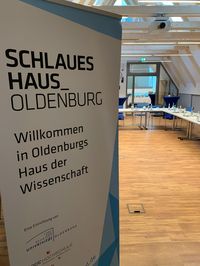
After almost five years, the research project REENEA ("Regional Energy Transition") is entering the home stretch. Therefore, the REENEA team hosted a final scientific workshop to discuss current research topics with an international scientific community. Many of the 12 scientists from Denmark, Germany, Norway, and Switzerland had already accompanied and supported the REENEA project in various functions over the last years.
The workshop took place at the “Schlaues Haus” at the city center of Oldenburg from September 21st to 22nd. In a total of three sessions, we discussed about actors and institutions in transition processes, about the "Phase II" of energy transition (which is, among other things, characterized by hydrogen and sector coupling activities), and about geographical multi-level dynamics of energy transitions. These three topics reflect the wide range of scientific debates to which the REENEA project was able to contribute during its runtime and continues to contribute. As part of the project, the team conducted a total of over 200 interviews with experts, analyzed other data using a wide variety of methods, and published 7 articles in international peer-reviewed journals to date. Fortunately, the REENEA project has been extended by the DFG ("Deutsche Forschungsgemeinschaft") until mid-2023, so that further results from the REENEA project can be evaluated in scientific publications in the coming months. The stimulating discussions from the workshop have provided us with many new impulses for this.
How do networking organizations and their role evolve as regional transitions advance?
Shortly before the summer break, the newest REENEA research on "The evolving role of networking organizations in sustainability transitions" has been published. In the paper, Sebastian Rohe and Camilla Chlebna analyze two regional energy networks: The Oldenburger Energiecluster OLEC e.V. and the deENet Kompetenznetzwerk dezentrale Energietechnologien e. V. from Northern Hesse.
Methodologically, Sebastian and Camilla combine interviews with experts and stakeholders from inside and outside the networking organizations with a social network analysis of the network members and their connections (expressed in joint participation of events and meetings).
The paper investigates what role OLEC and deENet played for their respective energy transitions, how the structure of both networking organizations changed over time, what kinds of tensions went along with these changes, and how policy makers and network managers might address these challenges. With this research, the REENEA team further contributions to debates around sustainability transitions, specially on transition intermediaries and the role of networks in evolving Technological Innovation Systems.
Our article is published in Technological Forecasting and Social Change: doi.org/10.1016/j.techfore.2022.121916
You can download it for free until 19th September 2022 following this link: authors.elsevier.com/a/1fVT998SGstkV
If you are interested in reading it after this date, please do not hesitate to contact us.
Transition work – how do actors shape transitions?
New article in EIST
In this conceptual contribution Meike Löhr, Camilla Chlebna and Jannika Mattes elaborate the approach 'transition work' for which we provide a definition and a typology. Our contribution is based on the theoretical foundation of 'institutional work' which we combine with assumptions from transition research. The basic assumption is that actors actively shape transition processes through their actions, bringing about changes in three dimensions - the technological, the political-institutional, and the organizational/actor-related. Actors influence the transition process, for example, by creating or inventing something new, by actively maintaining existing rules or institutions that continue to be useful, and by disrupting or rejecting outdated ideas, technologies, or measures that contradict their interests.
We apply our approach to two transition processes in the wind sector in Hamburg and Uckermark. Although the two cases are very different, we can show that both 'create', 'maintain' and 'disrupt' are integral parts of transition processes. In our contribution, we further differentiate the term 'disrupt', to encompass not only activities that trigger change, but also those that oppose that change, thus also recognising resistance to change.
We see our contribution as a starting point for further discussion in the research field. 'Transition work' can be embedded in other theoretical approaches, and also extended in the future.
Our article was published in Environmental Innovation and Societal Tansitions: doi.org/10.1016/j.eist.2021.12.005
You can download it for free until 9th March 2022 following this link: authors.elsevier.com/c/1eRYN7sbuJDHHj
If you are interested in reading it after this date, please do not hesitate to contact us.
At the intersection of Technological and Regional Innovation Systems – New article published in ‘Geoforum’
Research on the Geography of Innovation recognizes that innovation is multi-scalar, but we lack a systematic understanding of how innovation dynamics for specific technologies vary between regions. In the most recent REENEA publication, Sebastian Rohe and Jannika Mattes address this gap. The paper has now been published in the journal ‘Geoforum’.
The conceptual article combines research on Regional Innovation Systems (RIS) and Technological Innovation Systems (TIS) to highlight regional heterogeneity in TIS in a systematic way. It derives distinct ideal-typical configurations in which TIS organizations and institutions promoting a specific technology interact with general regional innovation support structures. These structures include various subsystems (science and education, industry, finance, politics and administration, civil society, and intermediaries).
Cases studies from the REENEA project on the onshore wind sector in Germany serve as empirical illustrations. The regions North Frisia, Magdeburg, and Oldenburg differ systematically in their ability to govern regional innovation autonomously, as well as in the spatial reach of their business innovation activities. The empirical cases help illustrate ideal-typical localist-grassroots, interactive-networked, and globalist-dirigiste TIS/RIS configurations. Each contributes differently to knowledge and market formation within the global technological system. For instance, market formation in the localist-grassroots configuration is associated with multiple niche markets, driven by regional entrepreneurs, and relies on regional demand and market advantages. On the contrary, market formation in the globalist-dirigiste case is driven by (inter-)national regulation and companies from outside the region and it rather relies on extra-regional demand and national market advantages.
Each configuration is also confronted with the innovation-related challenges of organizational/institutional thinness, lock-in, and fragmentation to a different extent. For instance, in the interactive-networked case, a feeling of complacency might facilitate a lock-in situation in which actors do not move beyond those activities already safely established. These insights can inform regional innovation policy aiming to push novel and more sustainable technologies. From the perspective of the global TIS, the typology underlines diverse roles of regions in developing and diffusing technologies: Some act as s niche hotbeds (localist-grassroots), some as hubs for linking innovation to other sectors (interactive-networked), some as specialists for technology production (globalist-dirigiste).
The article (doi.org/10.1016/j.geoforum.2022.01.007) has been published in the journal ‘Geoforum’ (impact factor 2021: 3.901). Until March 12th, 2022, the article is available for open access download under this link:
authors.elsevier.com/a/1eSWT3pILaAB6
After this date, we will be happy to provide it to you directly if you are interested.
Dissertation in the REENEA Project successfully completed and defended: The Role of Regions in the Technological Innovation System for Wind Energy
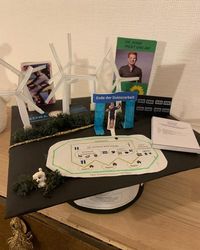
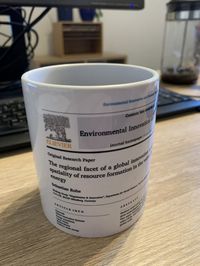
Within the REENEA project, Sebastian Rohe has successfully completed his PhD. The dissertation titled "Zooming in on a multi-scalar innovation system: The role and relevance of regions in the onshore wind energy sector in Germany" was already submitted on the 21st of July 2021. Prof Jannika Mattes, head of the WG "Organization and Innovation" at the University of Oldenburg wrote the primary review of the thesis, Dr. Christian Binz from EAWAG (Swiss Federal Institute of Aquatic Science and Technology) acted as co-examiner.
In the cumulative dissertation, onshore wind energy is conceptualized as a "Technological Innovation System" (TIS) and the role and importance of regions or the regional level in the multi-scalar and established TIS for wind energy is analyzed. In individual research papers, the regional facet of different value chain segments are examined; a systematic comparison of TIS interactions with Regional Innovation Systems is drawn; and regional differences specifically in the technological legitimacy of wind energy or the development of regional energy networks are analyzed. Empirically, the dissertation is based on case studies of five regions in Northern Germany investigated by the REENEA project.
The 50-page framing paper contains a comprehensive literature review on the state of research on the geography of wind energy innovations. It also relates the individual research contributions to each other and summarizes key findings. The framing paper is available online at the following link: 10.13140/RG.2.2.17381.32489/1
On December 3, Sebastian Rohe defended his dissertation in front of the members of the examination committee and some guests, some attending in presence, some online. At the end, the colleagues congratulated him with creative gifts, including an individual doctoral hat as well as well as a customized mug for the greatest coffee lover from the REENEA team!
Special Session, Presentation and Postdoc Panel - Camilla Chlebna participates in the Regions in Recovery Conference hosted by the Regional Studies Association
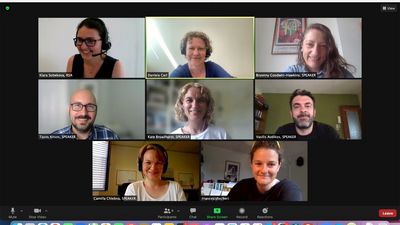
During the first two weeks of June, the Regions in Recovery Festival, hosted by the Regional Studies Association, took place. Camilla Chlebna represented the REENEA project with an ongoing paper project with Sebastian Rohe on "The evolving role of regional networking
organizations in energy transitions". She is also part of the CREST (City and Regional Sustainability Transitions) group with Will Eadson (Sheffield Hallam University) and Laura Norris (Cardiff University), which organized its own Special Session on "Geography of Energy Transitions". This was very successful and well attended with 17 presentations in 5 tracks, as well as a networking meeting. Finally, Camilla was able to share her experiences around networking, as part of a panel discussion with different postdocs.
Links to the videos of the presentation sessions and panel discussion (with thanks to Alex Holmes, RSA):
Panel discussion: www.youtube.com/watch?v=tF313bqeOGA
#1: Governing Regional Energy Transitions
#2: Communities and Place in Energy Transitions
#3: Quantitative analysis in regional energy transitions
#4: Unintended and unexpected consequences of regional energy transitions
#5: Critical Perspectives on Regional Energy Transitions
From Hamburg via Zurich to Trento - On a digital lecture tour
The only way to travel in the lockdown is digitally. Meike Löhr used this opportunity to present results of her dissertation and different paper projects.
The travel kick-off led to the Hamburg Science Congress on January 28, 2021, which marked the closing event of the project NEW 4.0 – Northern German Energy Transition. Within the framework of NEW 4.0, 60 partners investigated how the energy system of tomorrow - based on 100% renewable energies by 2035 - could look like in Hamburg and Schleswig-Holstein. The shared interfaces to the REENEA project became clear not least due to the similar case study selection. Meike Löhr presented results of a case study comparison on Hamburg and the Uckermark, on which she is working with Camilla Chlebna and Jannika Mattes, under the title "The design of transition processes through network formation and disruption: transition work in the wind sector". Using Hamburg and the Uckermark as case studies, the authors test their concept of 'Transition Work', which includes a toolkit for the analysis of actors' activities, which can be used, for example, to identify slowing down and accelerating forces in the transition process.
On February 4, 2021, Meike Löhr was given the opportunity to present excerpts from two paper projects at the SusTec Colloquium of the "Group for Sustainability and Technology" at ETH Zurich. Under the title "From dissent to consent? Comparing energy transition beliefs in Danish, German and French advocacy coalitions" she presented results from her dissertation. Different coalitions of actors shape the energy transition processes of the respective countries through their beliefs. The shifting of existing coalition boundaries and the disintegration of traditional actor coalitions indicate the emergence of new coalitions as well as the neglect of previous lines of conflict, such as over renewable energy. Taking up this idea, Meike Löhr discussed first ideas of a paper project on hydrogen in Germany. In this currently rapidly developing field, new alliances as well as new lines of conflict are emerging, which are worth investigating with a view to the future transition path.
Finally, her digital journey led her to the south, to Italy. The University of Trento hosted the fifth Energy & Society conference on February 10, 2021, with the resounding theme "Energy transition: Does the mountain give birth to a mouse?" The focus of this presentation entitled "From institutional work to transition work: Actors creating, maintaining and disrupting transition processes" was, as at the beginning of the trip, on the presentation of the theoretical concept 'Transition Work' (together with Camilla Chlebna and Jannika Mattes). This concept connects two theoretical debates, organisational research and transition research, and could be introduced to a wider community on this occasion.
Regional differences in the legitimacy of wind energy: New paper published in ‘Energy Policy’
We are very happy that yet another research output from the REENEA project has been published.
In the article, Sebastian Rohe and Camilla Chlebna analyze regional legitimacy: How do regional stakeholders perceive wind energy, not only the technology, but also the actors and practices involved? The particular focus lies on politicians and civil servants, as these regional decision makers shape where and how many turbines are built. Empirically, the article draws on our REENEA case studies of the Oldenburger Land and Uckermark-Barnim. Theoretically, the research adds to the debates around Technological Innovation Systems (TIS), the Geography of Sustainability Transitions (GeoST), as well as the emergent topic of spatial patterns in the legitimacy formation for industries and technologies. Our results show that legitimacy of a TIS in pragmatic (“What do we gain economically?”) and moral (“Are planning procedures manageable and fair?”) terms is particularly susceptible to place-specific influences.
Our research also has practical implications. For instance, while financial participation of regional stakeholders in wind energy is positive, the mere perception of regional added value also matters. This perception is strongly linked to the origin of the project developers. If they are rooted and/or well-known in the region, stakeholders are far more inclined to assess their actions as legitimate and to feel that they share profits fairly and pay taxes properly. Planning procedures also matter. Procedural legitimacy cannot be fixed by streamlined, top-down approaches. Instead, regional decision makers need to be equipped with the necessary agency, mandates, staff, and resources.
The article (doi.org/10.1016/j.eist.2020.02.002) has been published in the journal ‘Energy Policy’ (impact factor 2019: 5.042). Until April 5th, 2021, the article is available for open access download under this link. Afterwards, we will be happy to provide it to you directly.
“Regional pathways to Sustainability Transition”: Camilla Chlebna and Jannika Mattes present their work at the RSA CREST seminar series
On 21st January 2021 Camilla Chlebna and Jannika Mattes followed an invitation to present at the seminar series on City and Regional Sustainability Transitions (CREST) run by Laura Norris (Cardiff University, UK) and Will Eadson (Sheffield Hallam University, UK) through the Regional Studies Association (RSA). The successful format of the seminar is that an early career researcher presents alongside a more experienced researcher. Camilla presented alongside Christian Binz (EAWAG, Switzerland). Their presentations on recent and ongoing work were followed by a lively discussion on the aspect of fragility in regional energy transitions as well as on the greater question of the relationship between regional path creation and sustainability transitions. You can find a recording of the interesting session here (Thank you to Alex Holmes at the Regional Studies Association for producing this video): www.youtube.com/watch?v=nqYmLohKO3M
Results of a REENEA case study published as an anthology article: Development and challenges of the energy transition in the Oldenburg region
How does a sustainable and future-oriented economic system look like and how can it be established? The recently published anthology "Zukunftsdiskurse: Nachhaltiges Wirtschaften" (Discourses on the Future: Sustainable Management)” discusses this topic from a variety of inter- and transdisciplinary perspectives. The publication thus summarizes results of the project "Zukunftsdiskurse: Sustainable management between society, economy and education". Around 30 stakeholders from business, politics and science met in various discourse formats (including Sebastian Rohe from the REENEA team). The participants discussed the tasks and roles of various actors in a sustainable economic system, as well as the mechanisms at the societal, corporate and individual level that make such a shift towards sustainability possible.
The contribution by Sebastian Rohe and Meike Löhr in the anthology discusses these topics and issues in an exemplary manner under the title "Renewable energy supply through wind energy: Development and challenges of the energy transition in the Oldenburg region". The authors map the transformation of the regional energy system and driving dynamics over time. They also examine the strategies of actors in response to changing political conditions. Theoretically, they draw on concepts from transition research. Accordingly, socio-technical change (towards a sustainable energy supply or economic system) occurs through an interplay of cooperating and conflicting actors and institutions (laws, norms, routines and expectations). Based on in-depth empirical illustrations, the article shows the possibilities and limits of regional transitions.
The anthology is available for free download on the wbv open access website.
Two REENEA papers published in ‘Environmental Innovation and Societal Transitions’
The journal "Environmental Innovation and Societal Transition - EIST" (impact factor 2019: 8,4), published by Elsevier, focuses on the analysis of processes of innovation and transformation towards sustainability in the fields of energy, transport, agriculture and water. Accordingly, it is one of the best-known publication outlets for REENEA.
Recently, the second REENEA article entitled "The fragility of regional energy transitions" was published online and will go to press in the December issue. Camilla Chlebna and Jannika Mattes deal with the energy transition in Oldenburg: For each phase they describe the fundamental fragility of such transformation processes. In Oldenburg, this fragility is particularly pronounced in the current consolidation phase. However, the flexible response of regional actors on the ground will ensure further transformation. The article shows that energy transitions remain fragile even in supposedly "successful" regions. The transformation process can be delayed or interrupted at any time due to social and political dynamics within the region and their interaction with those outside the region. Until 15th October 2020, the article is available free of charge at this link. After that the authors and the REENEA team will be happy to make it available directly.
Additionally, the first REENEA paper by Sebastian Rohe has been published in the September issue of EIST. The paper entitled ‘The regional facet of a global innovation system: Exploring the spatiality of resource formation in the value chain for onshore wind energy’ had already been published online by the journal in February and has now been printed. Until 27th October 2020, the article is available free of charge via this link. After this, Sebastian and the REENEA team will be happy to provide it directly.
International Sustainability Transition Conference 2020 as online event
This year's 11th International Sustainability Transition (IST) Conference was held for the first time as an online event from August 18-21, 2020. Organised by the Austrian Institute of Technology and the Vienna University of Economics and Business Administration, around 650 international researchers presented their latest findings under the title "Governance in an Era of Change - Making Sustainability Transitions Happen". These were discussed in live lectures, as posters, in gallery sessions, as well as in breakout rooms and were accompanied by a virtual framework programme.
Meike Löhr presented the paper "Transition work: Analysing transition processes as interplay of actors, institutions and technologies - evidence from the German wind sector". Together with Camilla Chlebna and Jannika Mattes, she developed the concept "Transition work". This concept adapts the "institutional work" approach to transition processes. Central elements of the approach are the three forms "create, maintain and disrupt", which can be used to record the activities of actors in transition processes and to examine the development of institutions, actors and technologies. The authors apply the concept empirically to the wind energy transition processes in Hamburg and the Uckermark. A comparison of the regions shows that transition processes consist of all three elements, i.e. "creation, maintenance and disruption" but that their occurrence in the regions is very different. This points to a more consolidated transition process in Hamburg than in the Uckermark.
REENEA at the EGOS colloquium: Between organizational and societal transition

From July 1st to 3rd 2020, international scholars from different fields met at the annual conference of EGOS, the European Group for Organizational Studies. The conference was hosted by the University of Hamburg and took place as a virtual event. Jannika Mattes participated in the track “Sustainability Transitions: Bridging Systems and Organizational Perspectives to Tackle Grand Challenges” hosted by Jochen Markard, Birthe Soppe and Taran M. Thune. About 30 scholars from the fields of organizational studies and sustainability transition discussed perspectives that draw upon organizational and societal levels to enhance our understanding of complex transition processes. While the constructive debate highlighted insights into two largely separate debates and identified fruitful connection points, the disciplinary borders also remained visible, particularly in regard to promising outlets for publication. Jannika Mattes presented a conjoint paper with Meike Löhr that is entitled “Facing transition phase two: Actor strategies in a stagnating acceleration phase”. It investigates how different actor groups react to the current dynamics in the field of wind energy.
New publication
Energy transitions: An analysis of phases and actor coalitions in Denmark, Germany, and France
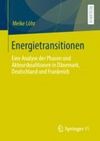
Actors are shaping the energy transition processes taking place worldwide not least through their convictions. In her thesis Meike Löhr examines the understanding and beliefs of actors and actor coalitions of energy transitions in Denmark, Germany and France in order to analyse the cognitive dimension of change and to contribute to a better understanding of energy transition processes.
Based on 71 expert interviews coupled with document analysis, this thesis traces the development and phases of the three transition processes from the 1970s to the present day. It highlights the shared transition goals and divergent transition paths in a country comparison. In a mixed methods approach combining qualitative content and cluster analysis, two different actor coalitions per country are being analysed based on the advocacy coalition framework. Their (un)shared understanding of energy transitions nevertheless shows a growing consensus about energy transitions. Traditional coalition borders as well as former lines of conflict over renewables and fossil fuels become less important. A “transition coalition” evolves – in increasing intensity from France over Germany to Denmark.
By building bridges between political science research and transition research, this thesis analyses the cognitive dimension of change and the determinants of energy transitions. This is a basic prerequisite for the design, implementation and acceleration of energy transitions.
Link: www.springerprofessional.de/energietransitionen/18033770
An accepted and inclusive wind energy rollout in Europe – REENEA at a conference hosted by the EU project ‘Win-Wind’
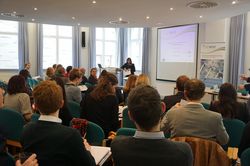
How can the rollout and diffusion of wind energy in Europe be designed in an acceptable and inclusive manner? This question was discussed by experts at the final conference of the EU project ’Win-Wind’ in Berlin on the 27th and 28th of February 2020. Sebastian Rohe from the REENEA team was among the 60 participants from science, politics, civil society and business.
Twelve partner organisations from six European countries were involved in the inter- and transdisciplinary Win-Wind project. One project goal was the transfer of experience, planning practices, policy recommendations and business models from wind energy model regions to regions where wind energy expansion has not yet progressed far. Furthermore, the project provides impulses for the development of a Europe-wide guideline and criteria catalogue for ‘fair wind energy’.
At the conference, it became clear that the acceptance of wind energy does not depend on the distance between residential buildings and wind farms. However, the participation of citizens and municipalities in the creation of economic value can certainly contribute to an accepted diffusion. But an inclusive, open and transparent planning process is also of great importance. Regional decision-makers in politics and administration are key players in this process. Sebastian Rohe referred to their important role during the conference, as well as to the importance considering regional differences and particularities in specific dimensions of acceptance. Sebastian Rohe and Camilla Chlebna have also written a journal article on these topics, that is currently under review.
First REENEA paper published: ‘The regional facet of a global innovation system: Exploring the spatiality of resource formation in the value chain for onshore wind energy’
Wind energy can be understood as an innovation system in which resources (knowledge, markets, investments, legitimacy) are decisive drivers for the development and diffusion of the technology. But how do different companies along the value chain create and use these resources at a regional level?
Sebastian Rohe examines this question in his contribution "The regional facet of a global innovation system", which has now been published in "Environmental Innovation and Societal Transitions". This is the first time we have been able to publish partial results from the REENEA project in a scientific journal. Empirically, the article is based on the case study of the wind energy sector in the Oldenburg region, for which the REENEA team conducted interviews with a total of 31 experts.
The article looks at and discusses the "spatiality of resource formation" for all value chain segments: From turbine production, to project development, downstream services, and the operation of wind farms. In manufacturing, for example, the required knowledge is concentrated in regions or company headquarters of the turbine producers, while market success is determined by the sales price on (inter)national markets. In contrast, market access in project development is a customized, spatially sticky resource that depends on access to regional actor networks (such as land owners or licensing authorities). Project developers and plant operators can increase the legitimacy of wind energy diffusion through regionally tailored practises and business models. Financial investments, in turn, are no longer regionally tied, as wind farms are increasingly perceived as attractive investment objects on global financial markets.
5th Geography of Innovation Conference in Stavanger, Norway, 29th to 31st January 2020
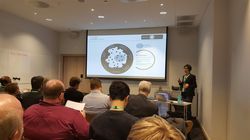
From Wednesday to Friday the community of researchers on questions of the geography of innovation from all over the world congregated in (very rainy and foggy) Stavanger in Norway. 312 papers were presented to a total of more than 400 researchers from 39 different countries at this fifth instance of the bi-annual conference. Jannika Mattes and Camilla Chlebna represented REENEA with two papers that the team currently works on.
Camilla presented a paper called “Grasping regional development: Towards a concept of transformative change”. This is a collaborative endeavor together by Camilla and Jannika together with Hanna Martin from the Center for Regional Research at Karlstad University in Sweden. The aim is to make a conceptual contribution towards a better understanding of transformative regional development dynamics by combining elements from economic geography and from transition studies into one integrative framework.
Jannika presented a paper called “Regional Transition Fields: Energy Transitions as Processes of Institutionalization” that she works on with the whole REENEA team. The paper proposes to view regional energy transitions as processes of institutionalization and illustrates this empirically with insights from several of the REENEA case studies on regional energy transition dynamics surrounding the wind energy sector.
Both presentations were received well by the participants who offered very constructive advice and comments which will contribute to the further development of the papers. Camilla and Jannika were very much inspired both by the various other presentations as well as by the discussions with colleagues from across the academic field.
Participation at the annual Winter Conference of the RSA in London, UK
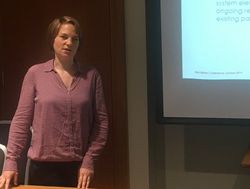
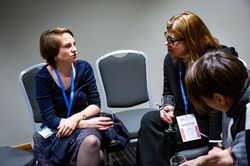
The annual Winter Conference of the Regional Studies Association (RSA) took place in London on 14th and 15th November 2019 with almost 200 participants. Camilla Chlebna took part for the last time in her role as Early Careers Representative on the board of the RSA. The task will be taken over by another Early Careers researcher at the beginning of 2020.
Camilla seized the opportunity to present an article she is working on, together with Hanna Martin from Karlstad University in Sweden and with Jannika Mattes, head of the REENEA project. The aim is to develop an integrative, theoretical framework to link the debates on economic geography and transition research in a meaningful way. The conceptual approaches were discussed vividly by those present.
In addition, Camilla and her colleague Donna Carmichael (representative of the doctoral students on the board) organized a network meeting where emerging researchers had the opportunity to exchange ideas directly with experienced colleagues. The meeting was a great success and was highly appreciated by all participants.
Once again the RSA in London offered a good opportunity to consolidate and expand the REENEA network in the field of geographic transformation research.
REENEA in direct exchange with the wind industry: Meike Löhr and Camilla Chlebna report on first project results at the “Spreewindtage”
With more than 2,000 participants from the wind energy industry, the 28th Wind Energy Days ("Spreewindtage") took place in Potsdam, Germany, from 5th to 7th November 2019. Numerous lectures on current challenges in the wind sector accompanied the established network meeting of the German wind industry as well as exhibition stands. Acceptance and continued operation of wind turbines were two of the most discussed topics among the participants.
Meike Löhr and Camilla Chlebna accepted the invitation of the FORWIND Institute of the University of Oldenburg to report on first project results. Camilla Chlebna discussed a subproject with Sebastian Rohe, which deals with the question of the legitimacy of wind energy with regional decision makers. The difference between generally supportive attitudes towards wind energy and the evaluation of concrete effects of wind energy on the regions is striking.
Meike Löhr reported on a subproject with Jannika Mattes, which deals with actor strategies in the current phase of the energy transition. Actors respond with different entrepreneurial strategies to the pressure on the industry caused by changing framework conditions. These may be individually rational, but have different effects on the energy transition process – partly slowing down, partly accelerating the transition.
All in all, the Spreewind Days offered interesting insights into the current burning issues in the wind industry as well as excellent networking opportunities.
RSA Student and Early Career Conference in Lincoln (UK): REENEA participates virtually
The Regional Studies Association (RSA) hosted its annual Student and Early Career Conference in Lincoln, UK from 31st October to 1st November 2019. Camilla Chlebna and Sebastian Rohe participated for the REENEA team, but without travelling to the East English city. Instead, they were linked to the on-site sessions via video chat. The RSA had invited Camilla and Sebastian to virtually attend the conference in order to test this new format. Thus the RSA and REENEA contribute to reducing the number of air trips in academia.
Camilla and Sebastian had the opportunity to talk about two recent REENEA papers. Sebastian presented the project "The Legitimacy of Onshore Wind Energy: Exploring Differences between Decision Makers across Regions". Based on a survey among regional decision makers from Oldenburger Land and Uckermark-Barnim, Sebastian and Camilla compare and contrast different dimensions of acceptance for wind energy development in both regions.
Camilla also presented another paper which she is currently working on with Jannika Mattes and Hanna Martin (Karlstad University, Sweden). The conceptual paper "Grasping regional development dynamics - towards a concept of transformative change" develops an integrative framework to analyse regional path development and sustainability transitions together.
REENEA meets energy experts from the Australian State of Victoria
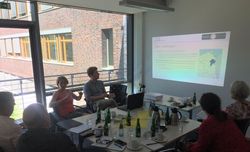
The energy transition in Oldenburg is arousing interest in Australia. At least with the five-member group of energy experts from the Australian state of Victoria, who wanted to learn more about the development of new, regional industries around renewable energies in the northern Netherlands and Lower Saxony. As part of this week long study tour, the travel group (with actors from science, administration and business) also met Camilla Chlebna and Sebastian Rohe from the REENEA team at a stopover in Oldenburg on June 25th. In a half-day workshop, the REENEA team presented the current state of their work and discussed with the Australian experts to what extent the developments in German regions (especially the Oldenburger Land and the Uckermark) are comparable to those in Victoria.
In addition to the metropolis of Melbourne, which is home to around five million people, Victoria also consists of rural areas such as Gippsland, that host the world's largest lignite deposits. This means that the region-specific conditions are completely different from those in the REENEA case study regions, which is why "lessons learned" cannot simply be transferred. Nevertheless, the group discussed some fundamental factors that can foster energy transitions: The need, for example, for the region to reflect on its existing economic, cultural or geographical strengths and to link the use of renewable energies sensibly to these; this is particularly successful if civil society actors are involved in discussions and decisions at an early stage. The promotion of "germ cells" in organisations and networks can also contribute to the development of new ideas, business models or technologies.
The committed exchange that was initiated by REENEA’s Mercator Fellow Prof. Lars Coenen from Melbourne was very instructive and enlightening for both sides. The REENEA team had the opportunity to increase the international visibility of the project results and to obtain further impulses and ideas for the comparison of the six case studies in terms of content and methodology.
REENEA at the International Sustainability Transitions Conference in Ottawa: Accelerating Energy Transition
From 23 to 26 June 2019 the International Sustainability Transitions Conference took place outside Europe for the first time at Carleton University in Ottawa, Canada. At the tenth IST Conference, current questions of (energy) transition research were discussed under the topic "Accelerating sustainability transitions: Building visions, unlocking pathways, navigating conflicts". The scientist Meike Löhr presented research results from the REENEA project. These dealt with actor strategies in response to changing conditions in the German wind sector. The introduction of tenders for renewable energies in Germany means a change in the funding system, which poses new challenges for stakeholders - from project planners and financiers to manufacturers. Whilst some particular effects are specific to the German system, the introduction of tenders is an international development as part of the second transition phase which would have to be accompanied by an acceleration of the transition process. Theoretical and practical questions concerning the acceleration of the transition process were the focus of the scientific debate among transition researchers and will also continue to occupy the REENEA team.
Camilla Chlebna introduces the REENEA project and the case study Uckermark at the EWE regional dialogue session in Brandenburg on 19th June 2019
On invitation of the regional utility EWE I seized the opportunity to present REENEA and some preliminary results from the case study in the Uckermark region at the EWE regional dialogue session in Strausberg in Brandenburg. Other inputs were an update from the EWE enterprise and a best practice example of a smart energy neighbourhood in the Petershagen/Eggersdorf community. The short input on preliminary results from the case study resulted in a lively exchange amongst the present regional representatives. The contents were vehemently discussed amongst the around 20 participants and I was able to collect numerous recommendations for further interview partners and also was able to broaden our understanding of the region even further.
Regional Studies Association Annual Conference, Santiago de Compostela, Spain (05 – 08. June 2019)
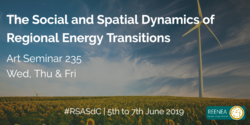
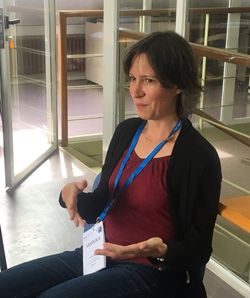
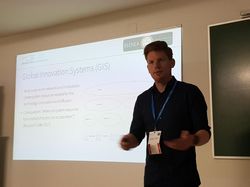
The annual conference of the Regional Studies Association (RSA) in Santiago de Compostela, Spain, was attended by around 460 scientists, including three members of REENEA. A special session organized by the REENEA team focused on the social and spatial dynamics of regional energy transitions. The topicality and relevance of the research area was confirmed by the high number of submissions. The session was the largest of all special sessions at the conference. In a total of five sittings, 14 scientists from all over the world came together to present their projects and discuss their research. The sessions were well attended and the broad topics, including both theoretical and empirical contributions, were discussed vividly.
The REENEA team presented three papers at the conference: Camilla Chlebna and Jannika Mattes presented "When the novelty fades: Socio-technical, spatial and temporal dynamics of energy transitions", which has already been published as a working paper. In the second session Sebastian Rohe presented his paper "The regional facet of a global innovation system", in which he examines the significance of the regional level for the onshore wind energy innovation system and which is currently being reviewed. Finally, Jannika Mattes and Meike Löhr presented their article "Facing transition phase two", in which they analyse strategic responses of actors in the wind energy sector to changing framework conditions.
Overall, the conference offered a very good opportunity to develop a network for researchers in the field of Regional Energy Transitions within the Regional Studies Association, to further publicise the REENEA project and to discuss project results with colleagues with similar research interests.
On Saturday Jannika Mattes and Camilla Chlebna took part in the second Network Meeting for Early- and Mid-Career Women of the RSA. Jannika Mattes talked about the special challenges and strategies around obtaining a professorship and reported about her own experiences.
NEST in Lisbon: REENEA at the conference for young researchers of the sustainability transitions community
"Transitions to where? Shared values and visions for sustainability transitions" was the motto of the fourth NEST conference, which took place in Portugal on the 4th and 5th of April 2019. Around 80 young scientists met in Lisbon to exchange their ideas on this topic and present their research on various sustainability issues.
The REENEA team was represented by Sebastian Rohe, who presented the first paper of his dissertation. He examines the importance of the regional level for the wind energy sector on the basis of the first case study in the Oldenburg region. A conclusion from his paper: While knowledge is increasingly universally applicable and globally exchanged in this sector, the interaction of regional actors and networks remains crucial to create new markets and legitimacy for the technology.
Overall, the conference was a great opportunity to present a glimpse of the REENEA research and to establish further networks in the diverse and interdisciplinary community of “sustainability transitions".
Stakeholder workshop for the case study in Oldenburg on 27th March 2019
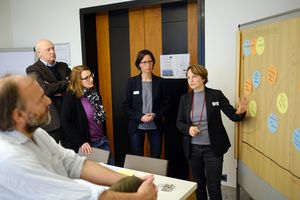
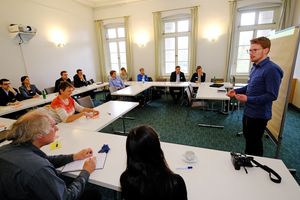
Around 20 participants, mostly interviewees from the Oldenburg case study, but also other interested parties from the regional energy sector, gathered for an afternoon at the PFL cultural centre to learn about the first REENEA project results and to reflect on particular aspects in more detail. Roland Hentschel, chairman of the regional energy cluster OLEC, welcomed the participants and emphasised some of the current dynamics in the sector. This was followed by a general insight into the course of the project and on some special features of the wind sector in the Oldenburg region by Prof Dr Jannika Mattes, head of the REENEA team. Then the participants split into two groups: 1) One group dealt with the course of change so far and with the current characteristics of the wind sector in the region. 2) The second group dealt with acceptance of wind turbine roll-out and discussed influential factors and actors. Strengthened by coffee and cake, a summary of the workshop results and some highlights from further case studies in Magdeburg, Hamburg and the Uckermark followed. The participants found the actor structures and other specificities of these regions in comparison with Oldenburg particularly interesting. The tight network of the local actors, for example, has emerged as a specific feature of the wind sector in Oldenburg. The grown structures and the close relationships associated with them prove to be a significant locational factor. At the same time, the supra-regional perception of Oldenburg as a research location appears to be expandable. The event ended with lively discussions amongst the stakeholders as well as with the REENEA team.
Research Visit and Workshop
Dr Hanna Martin visited the REENEA team for one week, from 4th to 8th March. It was a week full of interesting conversations, fruitful exchanges and mutually beneficial feedback on ongoing work:
Hanna Martin is a post-doctoral researcher at the Centre for Regional Studies at Karlstad University in Sweden. She is also employed as a researcher at the Department for Business Administration at the Business School at Gothenburg University, Sweden. Hanna has a PhD in social and economic geography from Lund University, Sweden that she completed in 2016. Her research interest lies at the intersection of economic geography and regional development, innovation studies and socio-technical transition studies. During her visit at Oldenburg University she joined the REENEA team to discuss different theoretical and empirical approaches for grasping grand societal challenges. The core challenge was the framing of regional transformations as social processes.
On Friday 8th March Dr Hanna Martin and the REENEA team were joined by Prof Jens Köhrsen for a one-day workshop:
Jens Köhrsen is an assistant professor at Basel University in Switzerland. Jens’ background is in sociology, religious studies and transitions research. He currently works on a project on “Urban Green Religions” which focuses on the role of religion in sustainability transitions. One particular focus of the workshop was the application of sociological theory to regional transitions. Jens presented a study which uses field theory to analyse the transition process in the Northern German city of Emden. The workshop participants discussed ways of developing field theory further to understand better the dynamics of interaction between field actors.
The collaboration between the involved researchers will continue with further visits and joint publications already underway.
Round table discussion on wind energy organised by the Landkreis Wesermarsch in Brake on 17 December 2018
Jannika Mattes and Sebastian Rohe participate as experts in the round table discussion on wind energy organised by the Landkreis Wesermarsch in Brake. The title of their lecture is 'Vielfältige Akteure und gegensätzliche Interessen im Windenergieausbau: Energiewandel als sozialer Prozess'.
First REENEA paper presented at yearly winter conference of the Regional Studies Association (RSA) in London, UK on 15th and 16th November 2018
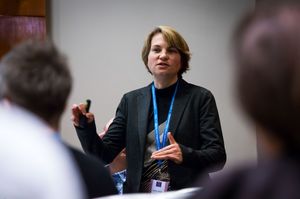
A second time Camilla Chlebna seized the opportunity to present REENEA’s first paper output “When the novelty fades – The role of fragile stabilisation for regional energy transitions” to the regional studies community as she attended the annual RSA winter conference in London. Here are some impressions. More than 200 participants from 31 countries presented their research at the conference titled “New Horizons for Cities and Regions in a Changing World”. Both at fringe networking events as well as at the conference Camilla was able to further expand the REENEA network.
REENEA at the Student & Early Careers Conference of the Regional Studies Association (RSA) in Brighton, UK on 25th and 26th October 2018
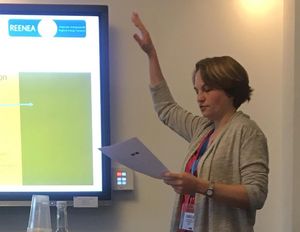
Around 50 participants, both PHD students and early career researchers (within 5 years of finishing their PHD), met at the yearly Student and Early Careers Conference of the RSA in Brighton, UK. In this relatively small setting emerging researchers could exchange career development tips, for example on publication strategies, and had the opportunity to present their current projects. As Early Careers Representative on the board of the RSA Camilla Chlebna attended this conference and she also seized the opportunity to gain feedback on the first REENEA paper “When the novelty fades – The role of stabilisation for regional energy transitions” from the community of emerging researchers at the RSA. Feedback was very positive and constructive and will contribute greatly to the further development and improvement of the paper.
REENEA in Magdeburg: BWE seminar and first interviews in the case study region (22-25 October 2018)
To kick off the REENEA case study in and around Magdeburg, Meike Löhr and Sebastian Rohe travelled to the state capital of Saxony-Anhalt during the week of 22-25 October. There, they attended the seminar of the industry association BWE "Basics of onshore wind energy". In the three-day seminar not only technical, legal and economic fundamentals for the planning and operation of wind turbines were conveyed, but also current challenges and developments in the sector were discussed. The seminar was accompanied by an excursion to Enercon in Magdeburg-Rothensee. The REENEA team also used the stay in Magdeburg to conduct a first expert interview in the case study region and to gain further contacts.
Visit of the wind energy fair, WindEurope in Hamburg, 27th and 28th September 2018
On 27th and 28th September a group of REENEA researchers visited WindEurope, Europe’s largest wind energy fair, in Hamburg. Both at the industry conference as well as at the wind energy fair they gained an impression of the challenges of and the current debates and themes within the German, the European, and the global wind energy sector. At the fair they made interesting contacts and further expanded the network of the REENEA team.
Choice of case study regions, August/September 2018
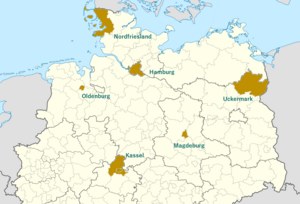
Following an intensive exploratory period, the regions for the next case studies in the REENEA project have been agreed. To allow a clear focus REENEA uses small scale regions (NUTS3 level or “Landkreis” in Germany) as starting point but remains open for the regional boundaries which agents define themselves. Following the pilot study in Oldenburg case studies in Uckermark, in and around Magdeburg as well as in Hamburg are currently being started. Case studies in Bremerhaven/Cuxhaven and Nordfriesland will follow. At the same time the REENEA team also considers developments on the super-regional [and international] level and will therefore do interviews with agents who have this perspective in parallel to the regional case studies.
Energy transition: actors in flow (6 September 2018)
At the Science Soirée, the audience is appointed in a lottery. Jannika Mattes presented empirical results from the Oldenburg case study of the REENEA project in front of about 30 people. In the discussion that followed, it particularly became clear how important also interested citizens regard social science research in relation to energy transitions.
Presentation at the Congress of the German Sociologists’ Association in Göttingen (September 2018)
Jannika Mattes, Camilla Chlebna, Meike Löhr, Sebastian Rohe attended the 39th Congress of the German Society for Sociology (DGS) in Göttingen (24.-28.09.2018) with a lecture on 'Regional Transition Fields: Energy Change as a Social Process'. The presentation took place in the joint event of the sections Organizational Sociology and Science and Technology Research, which was entitled "Innovation Fields. Fields of Action for the Coordination of Complex Innovations". In the discussion of the various contributions, it became clear how difficult it is to empirically break down and apply the concept of Strategic Action Fields. At the same time, the various field-theoretical approaches worked as a good link between the very different research areas.
Annual Meeting of the Energy Cluster Oldenburg (OLEC)
Oldenburg (30. August 2018)
At the annual meeting of the Energy Cluster Oldenburg (OLEC), innovative energy projects from the North-West region around Oldenburg were presented, and regulatory challenges were discussed with stakeholders from science, administration and the economy. The REENEA team contributed to the annual meeting by sharing their first insights regarding the development of the regional wind energy sector: Sebastian Rohe presented first results from the Oldenburg case study to regional energy actors. Therefore, the meeting was a great opportunity to increase the regional impact of the project by sharing some early results and gaining feedback from the practitioners – some of whom had participated in interviews during the field study. After the presentation, there was a lively debate amongst audience members how best to increase the acceptance and legitimacy of the use of wind energy at the regional level – a question which had also been identified by the REENEA team as important within the region. In the final panel discussion, Sebastian Rohe argued to put more effort into the issue of acceptance not only in innovative pilot projects, but also in the routine, business as usual development of established technologies. The discussants further called for the possibility for regional pilot projects to be exempted from certain national regulations to facilitate the testing of new solutions. You can find more information here.
International Sustainability Transitions Conference
Manchester, United Kingdom (11.-14. June 2018)
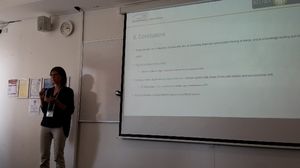
Three members of the REENEA project team represented the department for European Societies at University of Oldenburg at the International Sustainability Transitions Conference in Manchester in the United Kingdom from 11th to 14th June 2018. During four intensive days Jannika Mattes, Meike Löhr and Camilla Chlebna established many new international contacts, heard of interesting current research projects and got to know the political and industrial Manchester along the way. Jannika Mattes presented the status quo of the REENEA project to a full seminar room. Numerous questions both right after her presentation and throughout the conference period show the strong interest that REENEA raised with the transitions community.
Regional Studies Association Annual Event
Lugano, Switzerland (4.-6. June 2018)
![[Translate to English:] Foto: Sergio Montero](/f/1/_processed_/9/2/csm_RSA_2018_Camilla_a8c28b0ecc.jpg)
More than 500 participants from the regional science community joined the annual meeting of the Regional Studies Association in Lugano at Lake Ceresio in Italian Switzerland in June 2018. Camilla Chlebna represented the University of Oldenburg as Early Careers board member on the governing board of the RSA and also as researcher in the REENEA project. She introduced the theoretical framework of the project and first results from the pilot study in Oldenburg and was able to gather valuable feedback from the regional science community.
Workshop Energy Systems in Transition – The Role of Actors in Regional Change Processes
(3./4. May 2018)
On 3rd and 4th May an introductory kick-off workshop organised by the project team of the DFG funded REENEA project led by Prof Jannika Mattes took place at University of Oldenburg. Ten internationally renowned transition scholars followed the invitation to the event titled “Energy Systems in Transition – The Role of Agents in Regional Transition Processes” and gave inspiring talks. Discussions amongst participants immediately after the talks were lively and continued informally over coffee and cake. The REENEA team gained important insights on the relations between agents and institutions and on the relevance of the regional level in wider reaching transition processes. The team wishes to thank the Jean Monnet Centre of Excellence “Europeanising Coastal Regions” for the financial support of the workshop.
"Uni am Markt": Regional Energy Transitions under the Magnifiying Glass - The Role of Actors (28. April 2018)
Jannika Mattes: Lecture at "Uni am Markt", organised by the Center for Lifelong Learning (C3L).


